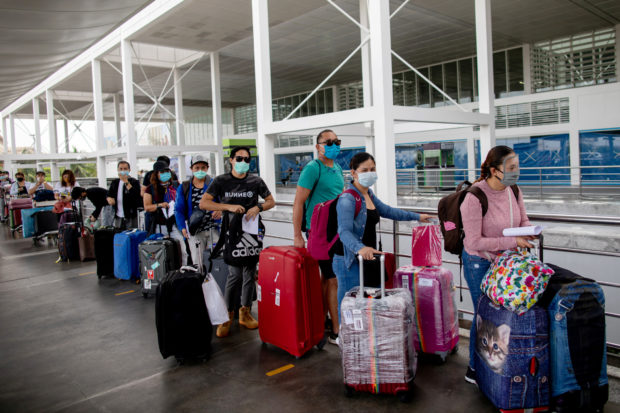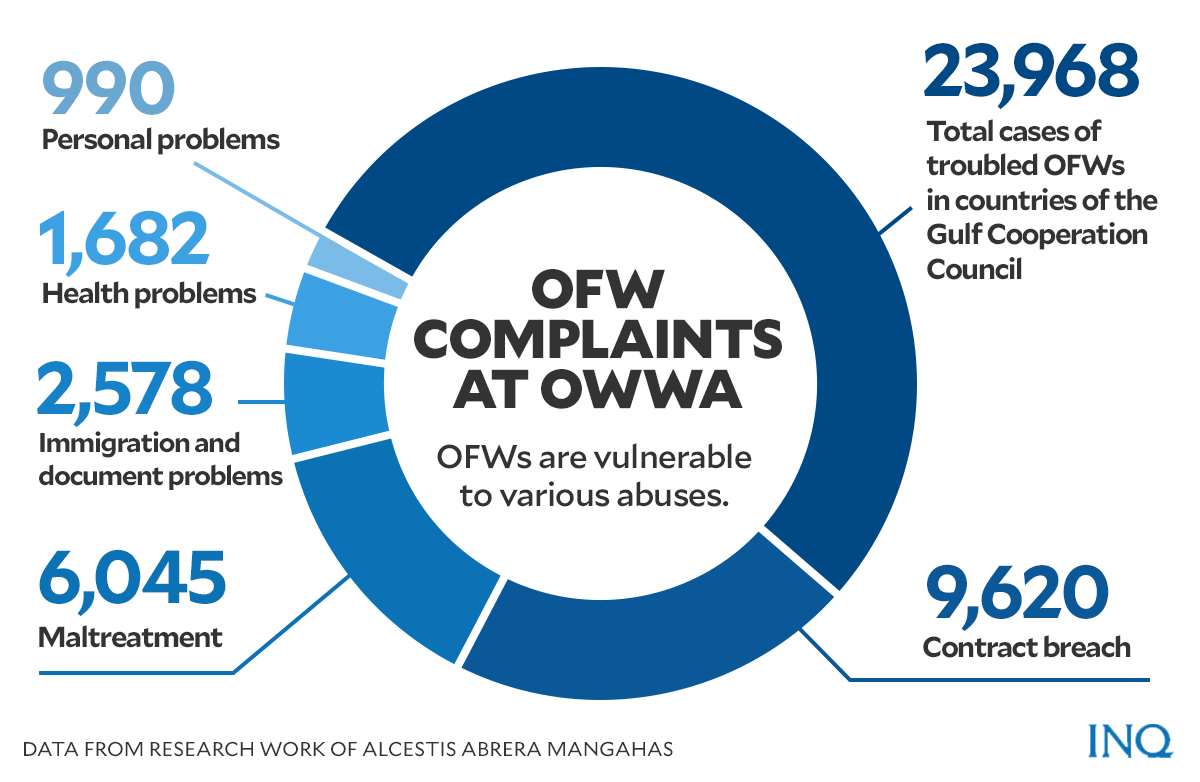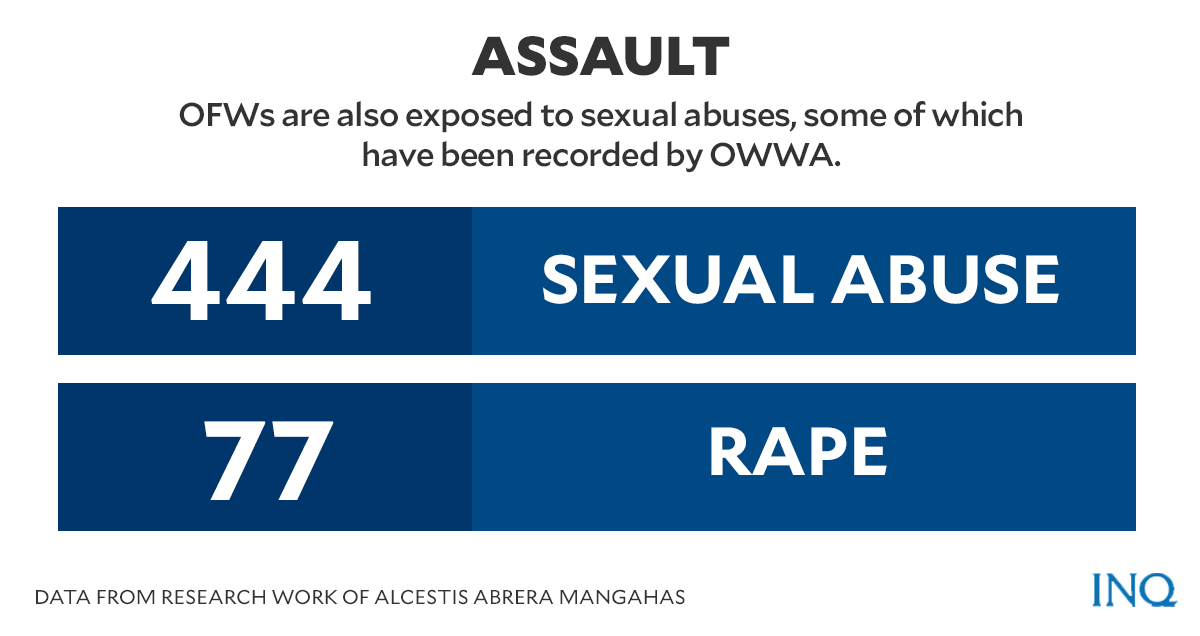Gov’t told: Protect OFWs, new department against corruption
MANILA, Philippines—The proposed new department for migrant workers and overseas Filipino workers (OFWs) must be run by qualified persons and should not be politicized amid the upcoming national and local elections, an advocate of Filipino migrant workers’ rights said on Wednesday (July 28).
According to Susan Ople, former labor undersecretary and president of the Blas F. Ople Policy Center, the government should “cast a wide talent search for best recruits” for the new department and “keep the hardworking, organic personnel with clean records of competent service.”
“What I’m worried about as a labor migration advocate is that in the creation of this new department, the institutional memory and those who really have the experience in handling cases and addressing the needs of our OFWs will be set aside,” Ople said at an online news conference.
“We also implore that once this new department is [created], please select the best people to run it. I hope that it won’t be politicized because we are coming to a more political electoral season,” she added.
Last May 31, President Rodrigo Duterte has certified as urgent the proposed Senate Bill No. 2334, a measure to create the Department of Migrant Workers and Overseas Filipinos (DMWOF).
Article continues after this advertisementDuterte had backed the creation of a department dedicated to OFWs since he was a presidential candidate in 2016. Election results showed massive support for Duterte by OFWs. In his last SONA on July 26, Duterte again repeated his appeal to Congress to create the new department for OFWs
Article continues after this advertisementREAD: EXPLAINER: A new department for OFWs, migrant Filipinos: What is it?
According to results of the 2019 Survey on Overseas Filipinos by the Philippine Statistics Authority (PSA) released in 2020, at least 2.2 million OFWs are abroad between April and September 2019.
Nearly all, or 96.8 percent, of them have existing work contracts.
However, Ople noted that the new department can not immediately end or reduce the barriers faced by OFWs in attaining justice overseas.
“I’m really concerned with the President’s push for a new department and the Senate President’s commitment that this will be passed soon,” she said.
“The expectations of our migrant workers will be so high so it’s very important to level the people’s expectation of what this new department can accomplish,” she added.
According to a research on labor migration entitled “Seeking Justice: Developing Improved OFW Feedback and Complaints Mechanisms” led and presented by Alcestis Abrera Mangahas, some of the barriers Filipino workers face abroad in seeking justice include:
- Threat, fear, and shame
- High costs,
- Confusing information
- Uncertain outcomes
“OFWs often find it untenable to seek justice under the destination country’s hardly understood institutions and fragmented laws and policies, especially when they are confronted with unfriendly immigration and work permit processes,” said Mangahas, who was also the former deputy regional director of the International Labour Organization (ILO) in the Asia-Pacific region.
Establishing a ‘hub’
Amid serious gaps in complaints and cases involving OFWs, the research study recommended the designation of a convergent hub.
According to Mangahas, the hub would stand as an oversight system that could help facilitate access, develop systems, pursue inefficiencies, monitor fair outcomes, and report on workers’ protection to those affected, various stakeholders, and the general public.
Through the hub, cases and complaints would be clustered depending on the nature of the complaint to facilitate a quick response.
“We should not be really waiting for that department to take place before even designing the convergence hub because this is long overdue,” said Ople.
“In fact when you have that hub ready, it will make the transition from the current setup to the new department easier because the tracking of cases and OFW concerns is taking place while the structure is being put up,” she continued.
Currently, the Overseas Workers Welfare Administration (OWWA), Philippine Overseas Employment Administration (POEA), National Labor Relations Commission (NLRC), and the Philippine Overseas Labor Office (POLO) of the Department of Labor and Employment (DOLE) receive and handle cases and complaints involving OFWs.
According to the research, the OWWA has received a total of 23,986 cases involving workers in the Gulf Cooperation Council (GCC) — an intergovernmental political and economic union that consists of Bahrain, Kuwait, Oman, Qatar, Saudi Arabia, and the United Arab Emirates.
The top five types of cases were contract violation with 9,620 cases, maltreatment or mistreatment with 6,045 cases, immigration or document-related problems with 2,578 cases, health or medical-related problems with 1,682, and personal problems with 990.
The OWWA received 444 cases related to sexual abuse or harassment and 77 cases of rape.
Out of the cases received by OWWA in 2020, 58 percent or 2,697 cases were already marked as settled.
Ople also urged the government to review existing grievance mechanisms for exploited migrant workers as the Senate deliberates on the creation of a separate department for overseas Filipinos and migrant workers.
“There has to be a clear mandate for this new department to make use of the laws of other countries and relevant international agreements to hold abusive foreign employers and foreign recruitment agencies accountable for exploiting our OFWs,” she said.


